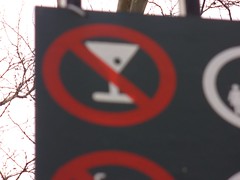Adventures in space, time and vodka
Here's a thought.
Cocktails destroy good spirits.
It's not my thought. It belongs to a man named Börje Karlsson, one of the master blenders involved with a new Swedish vodka called Karlsson's Gold (rated B+ by Drinkhacker!), in an article in the Washington Post. It's an interesting thought, not least because it comes from a vodka producer and vodka, well vodka is a bit troublesome.
 NO COCKTAILS?... by Metro Centric, licenced under Creative Commons.
NO COCKTAILS?... by Metro Centric, licenced under Creative Commons.
Imagine we've got a time machine, and rather than using it to buy last week's winning lottery ticket, we travel back to somewhere near the sixteenth century, somewhere in Eastern Europe, where the bouncing baby vodka tradition has just started walking and saying its first unintelligble words. Assuming that no-one burns us as witches on account of our strange fashions and bizarre future talk, we'll find a spirit that has mostly slipped past its origin as a medicinal elixir and is gaining popularity among the masses, flavored with herbs, honey and berries, and among the aristocracy who compete to create the purest liquid from their state-of-the-art pot stills. Skip forward a few hundred years and we'll find this spirit embedded in the culture, adding punctuation to any event, from weddings to birthdays to funerals and everything in between. Vodka becomes the lifeblood of the community, used and abused by the powers that be as something approaching a rum ration for an entire empire through the middle part of the twentieth century.
We should take in a little context. Travelling back to 15-whatever, when Western Europe raises a glass, it's likely to be brandy. The Scots and the Irish have started doing remarkable things with malted barley, but they're probably a good fifty/hundred years off hiding their distilleries at the end of obscure valleys in the most innovative and insane tax dodge ever. The Dutch have, by now, discovered a wonderful little berry that can transform a distilled spirit, but they'll have to wait until the eighteenth century for it to blaze through English society and emerge, smouldering, on the other side as something we'd recognise as gin. Over the next five hundred years, the various spirits of Western Europe will have their successes and failures. Cognac will emerge as the upper classes' drink of choice, only to be decimated by a hungry bug in the second half of the nineteenth century. Taxation, rebellion, famine, war and slavery will a play their part in the respective fortunes of gin, whisky, rum and whiskey, and things will continue in much the same vein until just after the world explodes in rage, hatred and a splatter of atoms.
The second half of the twentieth century sees vodka slowly seeping out from behind the Iron Curtain. It is not an entirely unknown quantity, largely thanks to a man named Smirnov. The right to produce his vodka eventually land with Heublein Inc. in the USA and the rest is, as they say, history.
In 2004, vodka sales surpass those of gin in the UK. In 2007, vodka outsells Scotch whisky. In Scotland.
And so, the trouble with vodka. It's simple, really. Western Europe and America do not have a vodka-drinking tradition. The way in which these cultures drink evolved alongside the spirits that they created and traded and vodka has been slapped onto it like go-faster stripes on the space shuttle. That's not to say that vodka doesn't have a part to play in the community of spirits, it's rather that the integration has been a little forced. The definitive original vodka cocktail remains the Moscow Mule (anyone who's just said "Martini"? Taxis are out front) because, on the whole, it doesn't sit well with structure of mixing drinks that evolved from the era of Jerry Thomas.
Börje Karlsson makes a good point from outside my - our - experience of spirits and cocktails, even if I think he's being a touch hyperbolic. Realising that there's a separation between the various spirit-drinking traditions can only be a good thing, because the really interesting stuff happens in the space between.